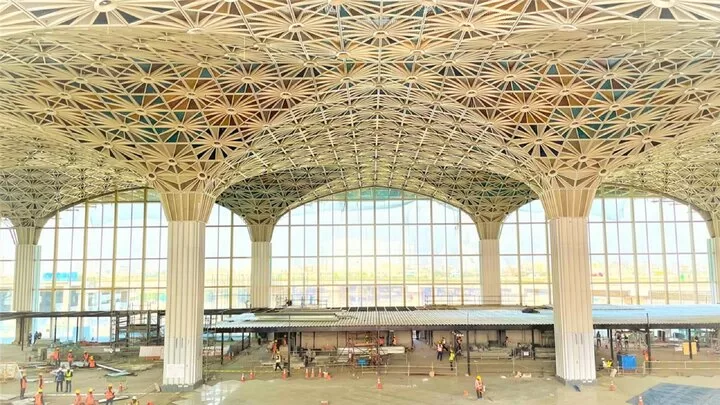Airports play pivotal roles in holding high a country’s image to the rest of the world. Dhaka’s rinky-dink airport Hazrat Shahjalal Internationa Airport (HSIA) serves as the primary landing point for the international flights but never experienced any notable transformation since its inauguration in 1980. The poor-quality service of the second terminal mandatorily urged Bangladesh to reform it to a word-class airport. For a developing country like Bangladesh, this expansion project is a luxurious step targeting to modernize the airport’s infrastructure, capacity and overall passenger experience.
History and current situation of HSIA
After the independence of Bangladesh, the airport’s construction was completed in 1980 which was named Dhaka International Airport. Later, the airport was renamed as Hazrat Shahjalal International Airport in 2010. Since its inauguration, the airport has always been struggling to keep pace with the growing passenger traffic. Despite having a capacity of 8 million passengers per year, HSIA is taking care of more than 12 million passengers annually. This overload of passenger has imposed a terrific impact on the overall airport service. Thus, to elevate passenger experience to a world-class standard, Bangladesh government has recently felt the importance of a significant infrastructural development of the airport which eventually would boost the economic growth, facilitate global connectivity and improve the image of the country to the world as well.
The Third Terminal: The Revival of HSIA
The Third Terminal is going to redefine Hazrat Shahjalal International Airport with its breathtaking design, avant-garde structure along with world-class facilities. With an annual passenger capacity of 20 million and an impressive area of 226,000 square meters, the terminal 3 project is scheduled for completion in 2025. The estimated cost of the whole project is US$ 2.3 billion. The Japan International Cooperation Agency (JICA) has joined hand with Bangladesh’s Civil Aviation Authority to fund and administer the project.
The terminal will offer plenty of benefits. It will manage up to 1.2 crore passengers every year. It will also offer its passenger the state-of-the-art arrival lounge, baggage handling system and duty-free shop and boarding bridges. Improved cargo and cold storage facilities have also been included in the project. To allow the aircraft to leave the runway quickly after landing, there are two rapid exit taxiways of 41,500 square metres. The project will make space for 115 check-in counters, 66 departure immigration desks, 59 arrival immigration and three VIP immigration desks. This revolutionary development in HSIA will introduce an improved immigration and customs processes with lesser wait time.
Also Read: Navi Mumbai International Airport: A New Era for Indian Aviation
Use of Cutting-edge Technology for Better Security and Efficiency
The security and the operational efficiency of the new HSIA is going to be outstanding with the application of state-of-the-art technologies. The processing speed of the airport has always been a matter of concern for the authorities and the passengers. There will be smart immigration e-gates, face detector and automated baggage handling systems which will take the processing speed at a premium level following strict security protocols.
Moreover, to maintain arrivals and departures more effectively, there will be an intelligent traffic control system. This system will upgrade flight schedules and reduce flight delays ultimately improving top-notch airport experience.
Economic and Business Impact
There is no doubt that with the operation of the Third Terminal, Bangladesh will see a gigantic leap in the field of international trade. Both local and international businessmen have always complained about certain issues like theft, delay in releasing of goods, higher freight charges, etc. Once the Third Terminal begins its full-fledged operation, these issues will be mostly solved. The Third Terminal will facilitate for the airlines to operate higher number of cargo flights making the business more competitive. Freight charges will come down notably which will add momentum to operate more business with the international industries.
The international standard facilities, improved efficiency and impeccable connectivity will open a new horizon for the tourism industry of Bangladesh.
Challenges
The bigger the project, the greater the challenges. The major challenge that Bangladesh will face is to maintain the standard of this mega project. No doubt it will take a lot of hard work to carry on all the facilities, service quality, safety and security measures for a long time. As the business will start to grow and a greater number of tourists will find Bangladesh an attractive tourist destination, the demand for air travel will rise. Sudden rise of the number of these flights and passengers will put Bangladesh in a tough test.
Conclusion
An airport is a gateway where the world enters and exits. It is the identity of a nation to the other nations. It creates opportunities for economic growth, tourism and diplomacy. Global connectivity, economic growth and sustainable development are deeply rooted in modern and passenger-friendly airport. With the Third Terminal of Hazrat Shahjalal International Airport, hopefully, Bangladesh will be able to create a new impression before the rest of the world.

Leave a Reply